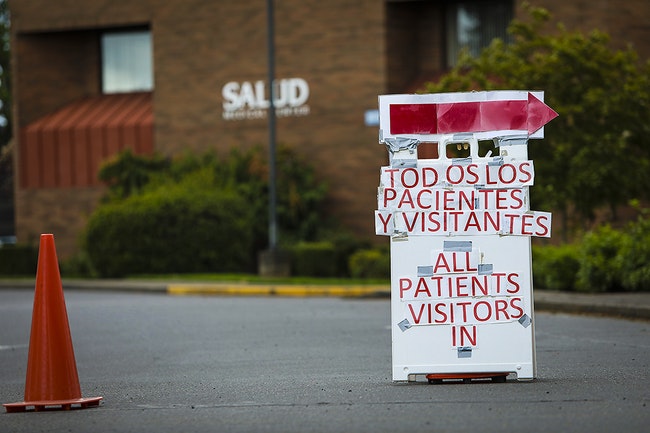 A sign directs patients at Salud Medical Center in Woodburn on Wednesday, April 29. (Amanda Loman/Salem Reporter)
A sign directs patients at Salud Medical Center in Woodburn on Wednesday, April 29. (Amanda Loman/Salem Reporter)
Hoping to better serve disadvantaged populations hard hit by the pandemic, the Oregon Health Authority has awarded over $2 million to 26 community-based organizations that serve Marion County to help with things ranging from rental assistance to free Covid testing.
The Oregon Health Authority is finalizing the distribution of the funds that’ll come in the form of contracts with local nonprofits to help with outreach, community engagement, testing and social services. The funds come from the federal coronavirus relief package passed by Congress over the spring. Across the state, the Oregon Health Authority is directing $9.4 million in federal relief funds to 173 community-based organizations.
“These contracts represent a paradigm shift for OHA,” said Pat Allen, the director of the Oregon Health Authority, on a press call Friday. “We recognize the impact of long-standing health inequities rooted in systemic racism and oppression are having on COVID-19 in Oregon.”
The Covid pandemic has had a disproportionate effect on minority communities in Oregon. According to the most recent state numbers, Hispanics accounted for nearly 38% of Covid cases, despite making up just 13% of the state’s total population. Marion County has seen a similar disparity with Latinx individuals representing 44.5% of cases despite being 27% of the population.
The contracts will go to a range of organizations that serve multiple counties. In addition to targeting the Latinx community, they’ll also serve people with disabilities as well as Pacific Islander, Filipino, Marshallese, African American, immigrant and Slavic populations.
Izzy Ventura Meda, the executive director of Familias en Acción, said that the pandemic has exacerbated challenges Latinx people face around housing, food security and access to medical care.
“The need has been the same as it’s always been,” he said.
His organization will use the nearly $124,000 it received to connect Latinx families hard-hit by the pandemic with rent and utility assistance and other wraparound services. It’ll also be providing targeted communications to this population on the most current public health information.
Josh Graves, the CEO of Catholic Community Services of the Mid-Willamette Valley and Central Coast, said that his organization will use $60,000 from the Oregon Health Authority to expand its healthcare workers program in disadvantaged neighborhoods in Woodburn, Salem and Polk County. He said that seven of these healthcare workers will help educate people in these neighborhoods about the importance of social distancing, using face coverings and not attending or hosting large gatherings.
Graves also said his organization will seek to build community ties. He said that could involve neighbors supporting each other with things like watching each other’s kids so they can return to work.
Marin Arreola, program director with the Interface Network, said that his organization will use $78,400 to hold events where they provide free testing for the coronavirus. On Aug. 1, his group plans to test 200 to 250 people in Woodburn.
He also said that his group hopes to address the high-infection rate in the Latino population by developing educational materials and advertisements on how to prevent spreading the virus.
“We saw a big need to educate our communities,” he said.
Arreola also said that the Interface Network will be working with farmworkers, employers and health care providers to connect people who test positive with the right services.
Creating Opportunities will receive a $60,000 grant for outreach and social services with people with disabilities in Marion, Polk and Yamhill counties. Cheryl Cisneros, the group’s executive director, said that the pandemic has been a very isolating time for families with medically vulnerable children.
“I think these families are still feeling left behind as the community engages in the reopening process,” she said. “I think that we are experiencing and seeing families experience this deeper level of isolation as they are not able to do that.”
She said that her group will use $45,000 of the money to expand its outreach and find ways to connect families remotely. Cisneros said that her group has hosted an online tour of Disneyland with families. Her group also distributes activity kits through a drive-thru that families can share remotely.
She said they plan to distribute inflatable flamingos to families who will be invited to name them, dress them up and later share with each other online.
Creating Opportunities will use the rest of the money to help families that have children with disabilities navigate the social services network, helping them make appointments and directing them to resources.
SUPPORT ESSENTIAL REPORTING FOR SALEM – A subscription starts at $5 a month for around-the-clock access to stories and email alerts sent directly to you. Your support matters. Go HERE.
Contact reporter Jake Thomas at 503-575-1251 or [email protected] or @jakethomas2009.









